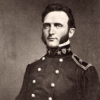Stonewall Jackson

Stonewall Jackson
Thomas Jonathan "Stonewall" Jacksonwas a Confederate general during the American Civil War, and the best-known Confederate commander after General Robert E. Lee. His military career includes the Valley Campaign of 1862 and his service as a corps commander in the Army of Northern Virginia, under Robert E. Lee. Confederate pickets accidentally shot him at the Battle of Chancellorsville on May 2, 1863. The general survived but lost an arm to amputation; he died of complications from pneumonia eight days later...
NationalityAmerican
ProfessionSoldier
Date of Birth21 January 1824
CountryUnited States of America